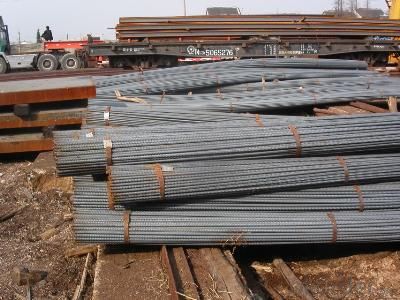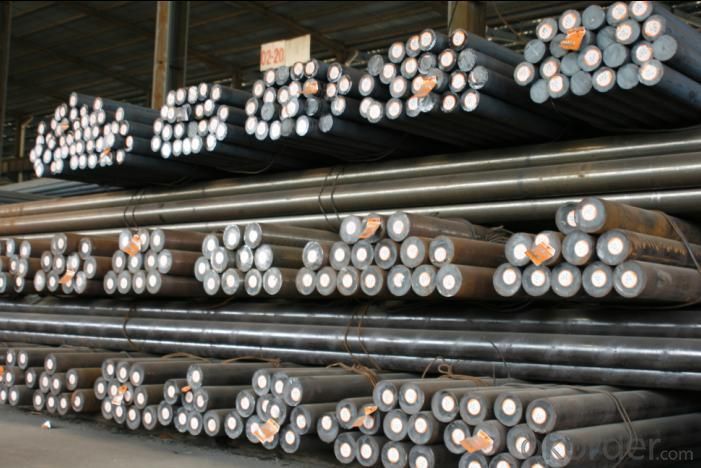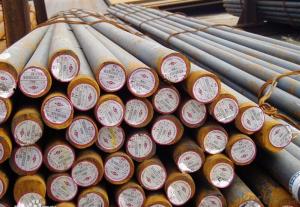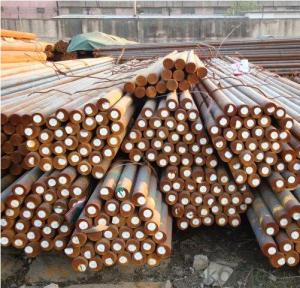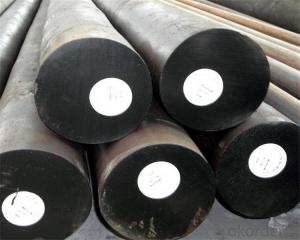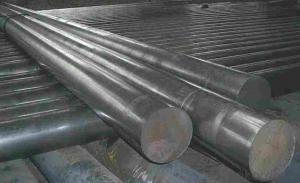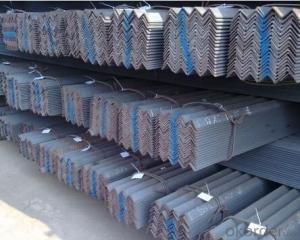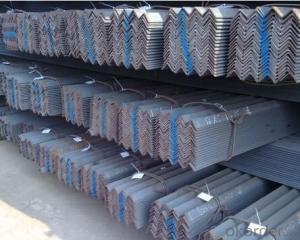Alloy Steel DIN 1.2379 with GB ASTM JIS
- Loading Port:
- China main port
- Payment Terms:
- TT OR LC
- Min Order Qty:
- 30 m.t.
- Supply Capability:
- 10000 m.t./month
OKorder Service Pledge
OKorder Financial Service
You Might Also Like
Specification
Alloy Steel DIN 1.2379 with GB ASTM JIS
Product Information:
1,Material: Forged Shaft
2, Good quality,competitive price
3,Diameter:100mm-1000mm
4, ISO9001 2000,BV,ABS
5,MOQ:30tons
Steel Grade:SAE 52100,Gcr15,SUJ2,4140,42CrMo4,4340,CK45,CK35,H13,D2,D3,1.2419,
9260,410,431,304,321,316,316L,1045,34CrNiMo6,100Cr6,A2,H21,SKD61,SKD11
5140,40Cr,5145,5130
Standards:ASTM,JIS,GB,EN(DIN,BS,NF) Or Per as clients’ requires.
1.Similar steel grade & equivalent steel materials:
| USA | Japanese | Gemany | British | France | International | Chinese |
| ASTM&AISI&SAE | JIS | EN DIN | EN BS | EN NF | ISO | GB |
| 52100 | SUj2 | 100Cr6 | 100Cr6 | 100Cr6 | ------ | GCr15 |
| 1.2067 | 1.2067 | 1.2067 |

Our Advantages:
· Industry experience over 20 years.
· Shipment of goods -More than 70 countries worldwide.
· The most convenient transport and prompt delivery.
· Competitive price with best service.
· High technical production line with top quality products.
· High reputation based on best quality products.
With our experienced, enthusiastic and dynamic staffs, we assure to bring you the products with best quality, reasonable prices and good after-sales services under the motto: Friends First, Business After.
Communication, Experience, Expertise and Best efforts are our Promises to you.
- Q: How does special steel contribute to the aerospace aftermarket industry?
- Special steel plays a crucial role in the aerospace aftermarket industry by providing high-quality materials that meet the demanding requirements of aircraft maintenance and repair. It is used in various aircraft components, such as engine parts, landing gear, and structural elements, where exceptional strength, corrosion resistance, and heat resistance are necessary. Special steel ensures the durability and reliability of these components, allowing for safer and more efficient flight operations. Additionally, its use in the aerospace aftermarket industry helps reduce maintenance costs and downtime, as it enables longer-lasting and more robust aircraft components.
- Q: Are there any international standards for special steel?
- Yes, there are international standards for special steel. These standards are developed and maintained by various organizations such as the International Organization for Standardization (ISO) and the American Society for Testing and Materials (ASTM). These standards ensure that the special steel products meet specific criteria for their composition, properties, and performance, enabling global consistency and compatibility in the industry.
- Q: How does special steel contribute to the manufacturing of bearings?
- Special steel plays a crucial role in the manufacturing of bearings due to its unique properties and characteristics. Bearings are mechanical components that facilitate smooth rotation or movement between two surfaces. Special steel, also known as bearing steel, is specifically designed to meet the demanding requirements of bearing applications. Firstly, special steel offers exceptional hardness, which is crucial for bearings to withstand heavy loads and high-speed rotations. The hardness of the steel allows the bearing to resist wear and deformation, ensuring a longer lifespan and reliable performance. Secondly, special steel possesses excellent corrosion resistance. Bearings often operate in harsh environments where they are exposed to moisture, chemicals, and other corrosive substances. The special steel used in bearing manufacturing effectively prevents rust and deterioration, ensuring the bearings can withstand these challenging conditions. Furthermore, special steel has superior heat resistance and thermal stability. Bearings can generate significant heat during operation due to friction and pressure. The special steel used in their production can withstand high temperatures without losing its structural integrity, preventing premature failure and ensuring consistent performance. Additionally, special steel offers exceptional strength and toughness. These properties are vital for bearings to withstand the intense forces and impacts they experience during operation. The high strength and toughness of the steel prevent fractures, breakages, and other forms of damage, contributing to the overall durability and reliability of the bearings. Lastly, special steel has excellent dimensional stability and machinability. This allows for precise manufacturing and shaping of the bearing components, ensuring accurate dimensions and smooth surfaces. The dimensional stability of the steel ensures that the bearings can maintain their proper fit and alignment within the machinery, minimizing any potential issues or malfunctions. In conclusion, special steel is essential in the manufacturing of bearings due to its hardness, corrosion resistance, heat resistance, strength, toughness, dimensional stability, and machinability. These properties enable bearings to withstand heavy loads, high speeds, harsh environments, and intense forces, ensuring reliable and efficient operation in a wide range of applications.
- Q: How is special steel made?
- Special steel undergoes a complex and precise manufacturing process, consisting of various steps. Initially, high-quality raw materials like iron ore and scrap metal are carefully chosen and then melted in a furnace at extremely high temperatures. This procedure eliminates impurities and forms molten steel. Once the molten steel is obtained, it is further refined to achieve the desired composition and properties. This is accomplished by adding various alloying elements like chromium, nickel, manganese, and vanadium. These elements enhance the steel's strength, hardness, corrosion resistance, and other specific characteristics necessary for the intended application. Following that, the molten steel is cast into different shapes, such as bars, slabs, or billets, using a process called casting. During casting, the steel is poured into molds and allowed to cool and solidify. The resulting solidified steel is then processed further using techniques like rolling, forging, or extrusion to achieve the desired shape and dimensions. After shaping, the steel undergoes heat treatment, which involves controlled heating and cooling processes. Heat treatment refines the steel's microstructure, improving its mechanical properties. This can involve processes like quenching, tempering, annealing, or normalizing, depending on specific requirements. Finally, the steel is subjected to thorough testing and quality control measures to ensure compliance with required specifications and standards. These tests encompass mechanical, chemical, and physical analyses, as well as non-destructive testing techniques, to verify the integrity and performance of the special steel. In summary, the production of special steel is a highly technical and specialized process that entails meticulous selection of raw materials, precise alloying, casting, shaping, heat treatment, and rigorous quality control. The end result is a steel with exceptional properties that can be tailored to meet the specific needs of diverse industries, including automotive, aerospace, construction, or manufacturing.
- Q: Can special steel be used in the renewable energy industry?
- Yes, special steel can be used in the renewable energy industry. Special steel alloys are often used in the construction of wind turbines, solar panels, and hydroelectric power plants due to their high strength, corrosion resistance, and durability. These properties make special steel an ideal material for various components, such as turbine blades, tower structures, frames, and support systems, ensuring the reliability and longevity of renewable energy infrastructure.
- Q: How does special steel perform in extreme pressure conditions?
- Special steel is specifically designed to perform exceptionally well in extreme pressure conditions. Due to its unique composition and manufacturing process, special steel exhibits high strength, durability, and resistance to deformation, making it ideal for applications where extreme pressures are involved. When subjected to extreme pressure conditions, special steel is able to maintain its structural integrity without undergoing significant deformations. This is due to its high tensile strength, which enables it to withstand tremendous forces without breaking or bending. Additionally, the special steel's hardness and toughness allow it to resist wear and damage caused by the intense pressure. Furthermore, special steel possesses excellent heat resistance, which is crucial in extreme pressure conditions where elevated temperatures are often present. The steel's ability to withstand high temperatures without losing its mechanical properties ensures its reliability and effectiveness even under the most demanding circumstances. Moreover, special steel has excellent corrosion resistance properties, making it suitable for use in extreme pressure conditions where exposure to corrosive substances is a concern. The steel's resistance to oxidation and other chemical reactions prevents it from deteriorating or weakening, ensuring its long-term performance and reliability. Overall, special steel performs exceptionally well in extreme pressure conditions due to its high strength, durability, resistance to deformation, heat resistance, and corrosion resistance. These properties make it a reliable and efficient choice for various industries and applications that operate under extreme pressure environments, such as oil and gas exploration, aerospace, automotive, and heavy machinery manufacturing.
- Q: What are the mechanical properties of special steel?
- Special steel generally refers to high-performance alloys that have enhanced mechanical properties compared to conventional steels. These properties can vary depending on the specific composition and heat treatment of the special steel. However, some common mechanical properties of special steel include high strength, excellent toughness, improved wear resistance, and good corrosion resistance. Special steel is often used in applications requiring exceptional performance, such as in aerospace, automotive, and tooling industries.
- Q: What are the requirements for special steel used in high-temperature applications?
- Special steel used in high-temperature applications, such as in the aerospace, power generation, and oil and gas industries, needs to meet certain requirements to ensure its performance and durability in extreme conditions. Some of the key requirements for special steel used in high-temperature applications are: 1. High Temperature Strength: Special steel used in high-temperature applications should possess excellent strength and resistance to deformation at elevated temperatures. This is crucial to ensure the structural integrity of components and prevent any form of failure or deformation under extreme heat. 2. Oxidation Resistance: The steel should have a high resistance to oxidation, which is the reaction between the metal and oxygen at high temperatures. Oxidation can lead to the formation of oxides on the surface of the steel, which can weaken its structure and compromise its performance. 3. Creep Resistance: Creep is the gradual deformation of a material under constant stress at high temperatures. Special steel used in high-temperature applications should have excellent creep resistance to prevent any excessive deformation or failure over time. 4. Thermal Stability: Special steel should have good thermal stability, meaning it can retain its mechanical properties even after prolonged exposure to high temperatures. This ensures that the steel remains reliable and performs consistently in extreme heat conditions. 5. Corrosion Resistance: In addition to oxidation, special steel used in high-temperature applications should also have good corrosion resistance. This protects the steel from the harmful effects of various corrosive agents, such as acids, alkalis, and salts, which may be present in the environment. 6. Thermal Fatigue Resistance: Thermal fatigue is the damage caused by repeated heating and cooling cycles. Special steel used in high-temperature applications should have high resistance to thermal fatigue to prevent any cracking, fracturing, or failure due to the stress caused by temperature changes. 7. Low Thermal Expansion: Special steel should have low thermal expansion to minimize dimensional changes and maintain dimensional stability under high-temperature conditions. This ensures that the steel retains its shape and size accurately, preventing any unwanted distortions or misalignments. 8. Good Weldability: Special steel used in high-temperature applications should have good weldability to facilitate the fabrication and joining of various components. This allows for the construction of complex structures and assemblies required in high-temperature environments. Meeting these requirements ensures that special steel used in high-temperature applications is capable of withstanding extreme heat, maintaining its structural integrity, and providing reliable performance in demanding conditions.
- Q: What are the advantages of using special steel in specific applications?
- The advantages of using special steel in specific applications include its enhanced strength, durability, and resistance to corrosion. Special steel alloys are specifically developed to meet the unique requirements of various industries, such as aerospace, automotive, and construction. These alloys offer superior performance under extreme conditions, allowing for lighter and more efficient designs. Additionally, special steel can be heat-treated to further enhance its properties, making it ideal for applications that demand high strength and toughness.
- Q: What are the main factors affecting the corrosion fatigue strength of special steel?
- The main factors affecting the corrosion fatigue strength of special steel include the corrosive environment, the presence of aggressive substances, the level of stress applied, the frequency of stress cycling, and the microstructure and composition of the steel itself.
Send your message to us
Alloy Steel DIN 1.2379 with GB ASTM JIS
- Loading Port:
- China main port
- Payment Terms:
- TT OR LC
- Min Order Qty:
- 30 m.t.
- Supply Capability:
- 10000 m.t./month
OKorder Service Pledge
OKorder Financial Service
Similar products
Hot products
Hot Searches
Related keywords




